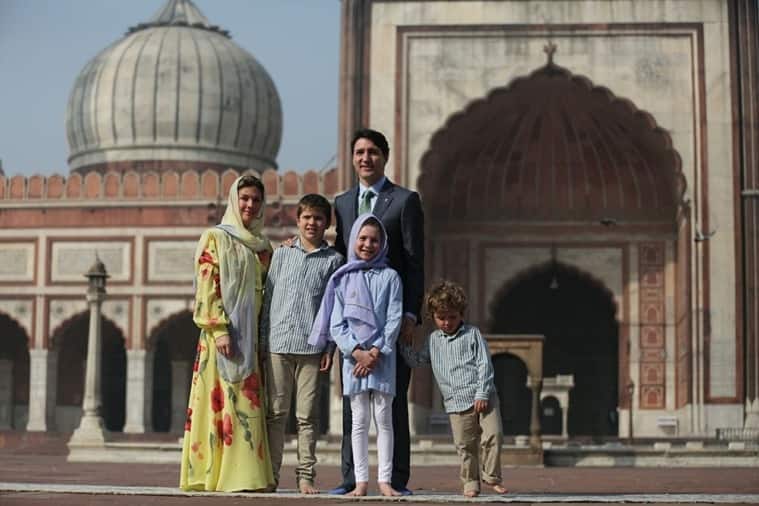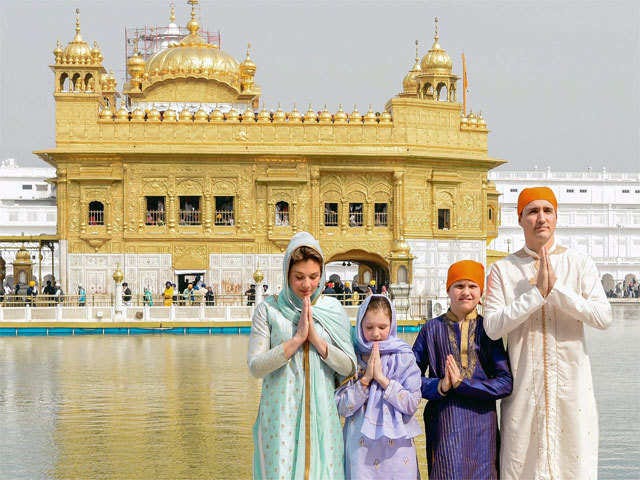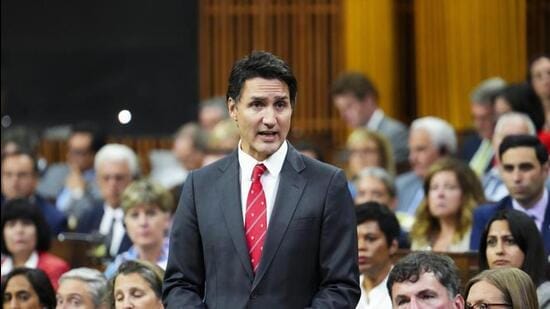Trudeau's Anti-India Utterances: A Ploy to Woo Muslim Voters?
He hopes that his stance will sway the Muslim Canadians, mostly from Pakistan, Bangladesh and the Middle East, even as he positions himself as a well-wisher of the expatriate Sikhs.
Trudeau's Accusation— we search for his domestic motivation
Recent allegations by Canadian Prime Minister Justin Trudeau, which tend to implicate Indian state actors in the murder of a Canadian Sikh citizen known for his anti-India stance, in Surrey, Vancouver, have stirred controversy on several fronts. With scant evidence to back these claims, India's Foreign Ministry was prompt in issuing an unambiguous denial. Made while the investigation is still in progress, Trudeau's assertions risk further destabilising the fragile bilateral relations between Canada and India1.
It is also imperative to scrutinize the motivations behind Trudeau's perplexing remarks, notably in relation to minority communities he seems to court for electoral gains. This article aims to delve into the complex interplay of politics and priorities that appear to inform Trudeau's stance on international issues, with a special focus on India. It examines the electoral influence of Muslim and Sikh communities in Canada on Trudeau's foreign policy decisions, while also highlighting his conspicuous silence on the Uyghur Muslim crisis.

Muslim Demographic Shaping Trudeau's Posturing
Statistics reveal that Muslims make up between 3 to 4% of Canada's population, easily outnumbering Hindus (1.5%) and Sikhs (1.4%) combined. The Muslim community in Canada is quite diverse, comprising migrants from Pakistan, Bangladesh, the Middle East, North Africa, Indonesia, and Malaysia, as well as to a lesser extent from India. Despite the media visibility of Sikhs in Canada, especially in towns like Brampton and Surrey, the electoral influence of Muslims is more substantial due to their larger numbers and strategic concentration in key electoral districts. This demographic sway appears to be contributing to Trudeau's seemingly tough stance against India.
Positioning himself as standing up to the 'Hindutva' politics of Indian Prime Minister Narendra Modi may find resonance with his Muslim constituents, particularly those who share a South Asian or Middle Eastern heritage. In a nation where electoral margins can often be wafer-thin, a swing vote from a community as significant as the Muslims could tip the balance. Meanwhile, the Buddhist population, constituting about 1.1% of Canada's populace and mainly hailing from countries like China, Japan, and Vietnam, tends to maintain neutrality in such geopolitical matters, perhaps because their countries of origin are largely disengaged from the issues at hand.
Uyghur Muslims: Persecuted in China, Ignored in Canada
While Prime Minister Justin Trudeau was swift to take a stand on a high-profile murder case allegedly involving India, his silence on the plight of the Uyghur Muslim community in Canada is striking. The Uyghurs, who hail from China's Xinjiang region, face severe persecution, categorised as "genocide" by human rights organisations, and are culturally, racially, ethnically, and linguistically distinct from the majority of Muslims in Canada. Although they are statistically classified as Muslims, most are not full-fledged Canadian citizens and are present in far smaller numbers. Despite their vulnerable status and ongoing harassment by Chinese agents, often enrolled as students in Canada, Trudeau's administration remains conspicuously silent. This glaring inconsistency suggests that Trudeau's reactions, as well as his silence, are driven more by domestic electoral imperatives than by his purported stance as a "champion" of international human rights.
Tame the Chinese Dragon within Canada, Mr Trudeau
Furthermore, if Trudeau is suffering from 'verbal diarrhoea,' so to speak, he should perhaps turn his attention to protecting the vulnerable Uyghur Muslim community within Canada's borders. Let him also speak against China, the proverbial 'Big Brother' that is flexing its muscles right inside Canadian territory. Until then, his accusations against other nations remain a stark example of a disturbing double standard that is being increasingly noticed on the global stage.
It is high time Canada takes a long, hard look at its foreign policy, especially when it involves the protection of vulnerable communities and its dealings with powerful nations like China. The moral high ground is a difficult one to maintain, and the first step towards it is consistency, something that currently appears to be lacking.
A Political Gambit Aimed at Domestic Electoral Sweepstakes
Trudeau's selective critique of India, juxtaposed with his silence on the Uyghur issue in China, suggests a tactical political agenda rather than a genuine commitment to human rights. The Uyghur community in Canada, although Muslim, is ethnically, culturally, and linguistically distinct from the broader Muslim diaspora originating from South Asia, the Middle East, and North Africa. As most Uyghurs in Canada are not yet full-fledged citizens, their sway over electoral outcomes remains limited. This stands in stark contrast to other Muslim communities that hold considerable electoral influence due to their size and citizenship status, and who may find Trudeau's anti-India stance appealing. Concurrently, Trudeau's recent posture could be a calculated move to gain support from both hardliner and moderate Sikh communities, thereby serving dual political objectives. In portraying himself as a protector of Sikh Canadians, Trudeau aims to capture diverse electoral constituencies, rendering his criticisms of India not as a matter of principle but as a politically expedient tactic.
Trudeau’s Outburst Driven by Electoral Politics
In summary, Trudeau's posture towards India is less about international relations and more a calculated domestic electoral strategy. Aimed at winning over his Muslim voter base—from South Asia, the Middle East, and North Africa—he concurrently seeks to appeal to both hardliner and moderate Sikh Canadians by presenting himself as their well-wisher, if not their outright defender. This tactic was strikingly evident during his February 2018 visit to India, where he and his family made a conscious pilgrimage to the Golden Temple in Amritsar. While his expression of respect and reverence for Sikh Gurus and traditions is commendable on its own terms, the political motivations underlying these actions are transparent to any keen observer.
Trudeau's strategy exposes a morally ambiguous position. While eager to court Muslim and Sikh voters, he appears willing to sideline communities like the Uyghurs, who lack substantial electoral influence, thus calling into question his professed commitment to human rights. The conspicuous silence on the well-documented suffering of Uyghurs in Canada, along with his failure to confront China, reveals that his human rights stance serves more as a domestic electoral tactic than a genuine ethical imperative. Notably, Hindus in Canada tend to vote independently based on economic and other issues, leading to a distribution of their votes across various parties, indirectly and inadvertently encouraging Trudeau's selective approach to community outreach.
Canada is now Engaging with a Resurgent India
In stark contrast to Trudeau's morally ambiguous and politically calculated approach stands the assertive leadership of India's Prime Minister Narendra Modi. Modi's steadfast commitment to safeguarding India's sovereignty, security, and territorial integrity is unwavering. He is prepared to take decisive action against both state-sponsored agents and private individuals who threaten the nation's interests, irrespective of their location. This shift in the assertiveness of Indian leadership may be disconcerting for Trudeau, who could be more accustomed to dealing with a less decisive Indian political landscape in the past.
Trudeau Needs to Introspect
As Trudeau navigates these ethical waters, Canada must reconcile its public posturing with its on-the-ground actions. The time for such introspection is pressing; otherwise, Canada risks a foreign policy landscape marred by double standards and a loss of global standing. Moreover, Trudeau will need to come to terms with a resurgent India, bolstered by strong political leadership, as an equal partner in the comity of nations, rather than engaging with it as a third-world republic.
PM Trudeau's Irresponsible Remarks about India
A Misguided Stance: PM Trudeau's Remarks and the Sovereignty of India The recent irresponsible remarks by Canadian Prime Minister Justin Trudeau have muddied the waters and cast doubt on Canada's stance towards India's unquestionable right to defend its sovereignty. While Trudeau assures re…









All politicians try to expand their vote banks. However, Trudeau has provoked India and will have to pay the price for it, sooner or later. He is son of his father😀
Both sides are dominated by political considerations. This is very dangerous trend in the global geopolitics.